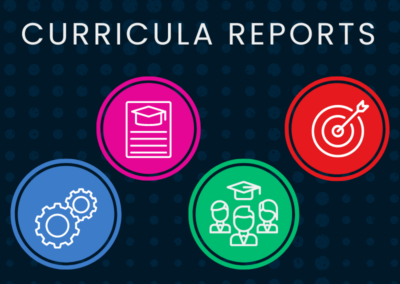How do you mobilise your school community on a strategic journey? This question was addressed during the ISC Research Edruptors@School conference in June. Three panel sessions on the third day of the conference explored this, looking at:
- How DEIJ and personal development strategies can support the development of all international school staff
- How three international schools are purposely widening learning experiences to enable aspirations for all their students
- How contemporary approaches to assessment and tracking during K-12 might widen access and opportunity for all young people
A growth path for DEIJ change
Introducing this panel discussion, Head of Global Research at ISC Research, Nalini Cook said that although DEIJ is on the radar of most international schools, many are yet to make any authentic, long-lasting change. “This is a journey that’s never complete, and one that remains every evolving,” she said. Nalini led a stimulating discussion involving Estelle Baroung Hughes, Principal of Africa Learning International and incoming Head of Secondary at the International School of Dakar, Angeline Aow, International Advisor at the Council of International Schools and curriculum coordinator at Berlin International School, and Joel Llaban, Director of DEIJ at International Schools Services.
Estelle began with a powerful statement: “International education was built in a colonial context; very elitist and a very, very exclusive brand. We made this happen, centering one culture and excluding others intentionally. So, it is time to undo this work as intentionally as it was done.” She explained that excellence looks different in different cultures. “We need to learn from other cultures,” she said, recommending schools recruit for potential and train each other.
Joel urged educators to grapple with reality: “Do not skip the stage of interrogation of inequity in your own communities in aid of white comfort, you have to ask the hard questions,” he said. “We need to name the inequities for us to define equity. We have to use our powers and privileges as levers for change.” Joel said ‘unconscious bias’ is becoming a buzzword for learning about DEIJ, and pointed out that this is an entry point only. “We cannot be hiding behind the veil of unconscious bias,” he said. “If we are to transform systems, we need to ask, what are the racist and sexist ideologies that are bedrocks of inequities in our systems? Leaders have to take ownership of this work.”
Angeline addressed curriculum and the difference between increasing diverse representation and decolonising the curriculum framework. “Decolonising a curriculum is about changing how we think about learning and teaching, and the way it has been enculturated to value certain ways of knowing and assessing,” she explained. Angeline urged educators to consider what an equitable classroom looks like, “where all identities are valued, and are treated with dignity and worth. Together you need to create clarity about what that looks like before you can have accountability,” she said.
Broadening learning pathways, shifting mindsets
This second session of the day involved Deepa Avashia, school leader at The Riverside School India, Erika Elkady, secondary school Headteacher at Jumeira Baccalaureate School, and Mariona Coderch Lopez, IBC Coordinator at GEMS International School Al Khail. They discussed that an aspirational learning environment requires the entire school community and goes way beyond curriculum alone.
Erika described Jumeira Baccalaureate as a character education school where students learn to develop character strengths that contribute to society rather than to obsess with grades. “The purpose of education is to prepare students for the future, to deal with the ups and downs of life so that they can really flourish…and to have experiences where certain values may collide,” she said. She described how, regardless of the curriculum pathway and qualifications, students from the school are ending up at the same university and in the same programme of study. This, she explained, has been a powerful message for students and parents. “Autonomy, belonging and competence is what motivates children from a young age,” she said. “If that is in place, people do well and the grade or the dream job will follow.”
Deepa explained the ‘I can’ mindset of Riverside School, and its mission to develop students with a belief that they can drive change without being rich, powerful, or old enough in order to achieve that. She described how the school worked to open up the traditional, narrow aspirational mindsets of some parents. “It took a lot of effort from the school to ensure that students start taking more courageous choices regarding their own interests and passions,” she said. She explained how students are no longer following one traditional academic path but instead are “physicists, dancers, and chefs, and pursuing whatever they feel,” she said. “That’s changed the outlook of a lot of parents now. So today, when parents are approaching Riverside, they are coming to us knowing the varied interests that our children have, and understanding that that’s the way to go forward.” Deepa emphasised the benefit of alumni talking to students and parents about alternative pathways and explaining the impact of this on their success and happiness.
Mariona discussed the benefit of offering alternative pathways that are presented as equal value to enable all students to have the chance to flourish. “Traditional schooling has made us lifelong academics, but that doesn’t necessarily prepare us for lifelong professional life skills,” she said. She described how the International Baccalaureate Career-related Programme (IBCP) has offered an alternative pathway to the IB Diploma Programme for some students. This has been enhanced by university partnership with Embry-Riddle Aeronautical University which is now offering a range of courses to students to complement the IBCP core. “We have many students that are super passionate about science, aviation, aeronautics… it seemed like a no brainer to find the transition to the last two years of high school for them related to aviation space, aeronautics and STEM,” she said.
“Broadening the growth path for students involves not only providing them with different options, but also helping shift the entire community’s mindset about the value of these options,” concluded moderator Pia Maske at the end of the session.
Learning success – what it can look like
The final session of this year’s Edruptors@School conference was an inspirational discussion about new ways to assess students and to shift thinking on what learning success looks like.
Conrad Hughes, Principal at EcoLint, told delegates about the Coalition to Honour all Learning. This currently involves over 50 forward-looking schools and higher education institutions that are sharing practice, networking, broadening transcripts, and influencing change towards high school assessment reform. “We need assessments that speak to human flourishing and what it means to be competent in a number of different domains, it’s about being more inclusive, letting every star shine,” he said, urging schools to get to know and profile students better through broader, more holistic assessment. He pointed out a number of alternative transcripts now being presented alongside academic qualifications, including the International School of Geneva’s Learner Passport, the Mastery Transcript Consortium, and the Global Citizenship Diploma, as well as the UWC diploma currently in development, and badging and digital credentialing that are all helping to change the way students are assessed. Conrad encouraged schools to formalise assessment they value. “If you don’t make it formal, the message you’re sending out is, it’s not actually that important,” he said.
Shabbi Luthra, Founder of the Learning Analytics Collaborative, talked about using multiple data points, including wellbeing and student support, to gain a complete profile picture of a student. From such a profile, she said, you can see “what kind of interventions are required for a child and understand what competencies need to be developed.” Shabbi stressed the need for students to see their data and understand their profile in order to develop personal responsibility for their own growth. “You can’t have conversations about growth without the learner being engaged in it,” she said.
Ed Fidoe, Chief Executive of the London Interdisciplinary School, explained how the university takes a highly inclusive approach to student admission: Regardless of qualifications, anyone can apply, with two interviews exploring applicant mindset, curiosity and self-awareness, and to test an ability to problem-solve. As a result, Ed claimed the university has a very high retention level and “the most academically diverse group of students in the world”. Students value the wider lens through which the peer group approach the learning and support each other he explained. Ed emphasised the value of collaboration in all stages of learning, explaining that within the university, this means a multidisciplinary faculty of philosophers, machine learning experts, biologists, human behavioural and scientists, collaborating to create a degree where students need to support and learn from each other. “The real world is like that,” he said. “At some point they have to open up and go broad.”
All three panelists agreed that assessment needs to be transformed, that every institution has a responsibility to work towards change, and that competencies matter and so should be assessed. Conrad summed this up: “A competent person doesn’t just execute a task. They show up on time, they are reliable, trustworthy, they’re problem solvers, they can adapt. So we should be talking about competencies rather than skills, it encapsulates what we want more. It also implies values. Skills alone can be used for dreadful things but if you start talking about competencies, you start moving into responsibilities that come with skills, and feelings of accountability, and custodianship and humanity ultimately.”
Thanks to Scholastic and ACER for sponsoring the day three sessions. For those who registered for the online conference, recordings of all panel discussions are available through the Edruptors@School platform until September.




